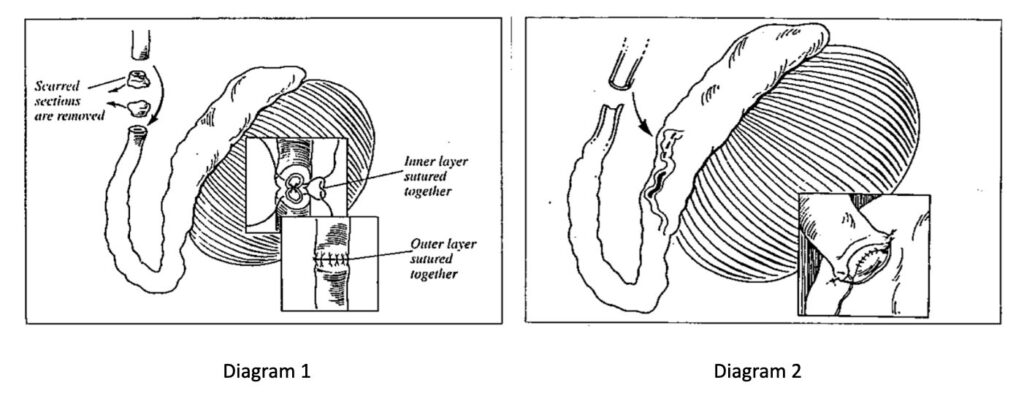What you need to know about vasectomy reversal
A vasectomy reversal is performed when a man wants to reverse his vasectomy, enabling the possibility of fathering children again.
Although a vasectomy should be considered permanent, things can change. A change to family planning goals or a new relationship, for example, may lead some men to seek reversals. It might be that a couple gets together later in life after one or both have already had children, and will plan for another child.
Thanks to advances in microsurgery, vaso-vasostomy (to use the technical name) is now a safe and effective option for men who want to pursue the opportunity of restoring their fertility.


In a vasectomy reversal, the cut ends of the vas deferens are reconnected and rebuilt to create an open vas channel.
What happens in a vaso-vasostomy?
Vasectomy is a form of male birth control that cuts the supply of sperm to the semen. Two tubes called the vas deferens carry sperm from the testicle to the urethra (the tube inside the penis). During a vasectomy, the vas deferens are cut and sealed in a short surgical procedure.
A vasectomy reversal (vaso-vasostomy) is a more delicate operation. The cut ends of the vas deferens are reconnected and rebuilt to create an open vas channel. This enables sperm to become part of the ejaculate again.
Two incisions are made in the scrotum and the ends of the phone-cable-sized vas tube are stitched back together using magnification and precision stitching. The inner channel is a fracture of a millimetre in size and must be precisely aligned. The suture material used in the procedure is nearly invisible.


Typically, vasectomy reversals are performed in one of our surgical centres under general anaesthetic and require no overnight hospital stay.
Patients will need a few hours to recover from the anaesthetic and we recommend that someone drives them home.
How effective are vasectomy reversals?
While a vasectomy reversal can restore a man’s fertility, this does not guarantee conception.
In most patients, sperm will be present again in the ejaculate three months after the reversal, but it’s important to note that it can sometimes take six to twelve months. Following a successful reversal, sperm counts may be lower than prior to vasectomy but pregnancy can still be achieved. Just like the chance of pregnancy for those couples without a history of vasectomy, pregnancy may take up to one year following the operation.
The most important factor influencing the success of a reversal is the amount of time that has passed between vasectomy and reversal.
A landmark study showed that in reversals done within three years of vasectomy, 75% achieved a pregnancy. For 3–8 years, 50% achieved a pregnancy and of those where there was a 9–14 years difference, 40% achieved a pregnancy.
Vasectomy reversals performed 14 or more years after the vasectomy resulted in 30% achieving pregnancy.
Other factors affecting the likelihood of pregnancy following vaso-vasostomy include:
- Type of vasectomy
- Procedure complications at the time of vasectomy
- Previous history of infertility
- Conditions such as diabetes or chronic illness
- Vasal obstruction due to scar tissue (occurs in about 5% of patients)
Female fertility factors, such as age, history of tubal surgery and history of pelvic infection, should also be considered.
Potential challenges will be investigated during a pre-operative appointment. This may include a blood test, to confirm that hormone levels are normal, and a physical examination.
However, it is important to note that some challenges may not be found until the surgery is undertaken. In some men, rejoining the vas isn’t possible so a more involved procedure, a vasoepididymostomy, is required to join the vas directly to the small tubules of the epididymis.


"The most important factor influencing the success of a reversal is the amount of time that has passed between vasectomy and reversal."
Dr Greg Phillipson
Preparing for surgery
Before surgery, a preoperative appointment is held to discuss the operation.
The patient will be given instructions on how to prepare for the operation, this includes:
- When to stop eating and drinking (typically 6 hours prior to surgery)
- Shave the hair at the front and sides of the scrotum from the base of the penis down
- Bring supportive underpants to wear post-operation
- Arrange safe transport home
- Consider taking a few days to a week off work to support recovery after the operation
What happens after a vasectomy reversal?
Patients usually go home the same day after a vasectomy reversal. We recommend that they rest for at least 24 hours and do not drive or operate machinery.
Side-effects and complications after a vasectomy reversal are rare or minor. There may be a small amount of bleeding where the scrotal incisions were made. Patients are encouraged to report any significant bleeding.
Most men experience similar recovery to that of a vasectomy: fatigue, muscle pain, mild nausea and pain around the site of incision are all common. Most symptoms can be managed with over-the-counter painkillers and rest.
Mild discomfort can occur during normal activities, including sex, for a few weeks afterwards.
COGA will do a sperm count five weeks afterward to test the success of the procedure and the doctor will check that all is well and healed correctly during a follow-up appointment.
How much does a vasectomy reversal cost?
There is a cost for the initial consultation, surgery and anaesthetist, as well as operating theatre and hospital charges. The total cost can vary depending on the duration of the operation, the type of operation required and any extras (such as overnight admission).
The cost for a vasectomy reversal in 2025 is typically around $15,000. COGA can advise of the total cost after your consultation once the surgical approach has been confirmed.
The cost of a vasectomy reversal usually isn’t covered by insurance. However, many couples feel it is worth it, to have the chance of having children again.
Vasectomy reversal at COGA
Dr Greg Phillipson is a specialist obstetrician and gynaecologist and certified subspecialist in male and female infertility with more than 25 years of experience. A skilled micro-surgeon, he has completed many successful vasectomy reversal operations at COGA.
Start with a consultation to get personalised advice for your situation. Contact our friendly team to book an appointment.



